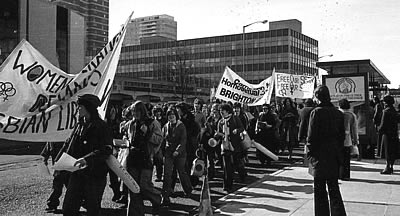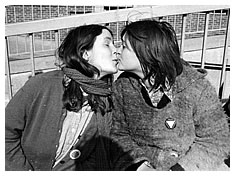

Issue 20 . Winter 2006
We Are Family . Theory & Practice . Herman Schrijver (1904-1972) . Book Review . New in the Archive . Larry Berryman
Theory & Practice
The International Women's Day celebration on 12 March 1977 – a surging of women's energy in Brighton – marked the formalisation of International Women's Day by the UN General Assembly. The slogan on the banner pictured 'WOMEN'S LIBERATION DEMENDS LESBIAN LIBERATION' referred to a demand adopted at the Women's Liberation Movement's national conference in Edinburgh three years earlier.

The Women's Liberation Movement in Britain had a number of demands that it made of the world. To start with in 1970 there were four, which dealt with equal pay and educational opportunity for women, contraception, abortion and child care. At the 1974 national conference, two more were added – the sixth being "An end to discrimination against lesbians and the right of all women to define their own sexuality." Brighton Women's Liberation Group member, Sandy Best remembers:
 "Back in 1974 there was still a tremendous
amount of discrimination against lesbians
within the Movement. The women who
instigated the Sixth Demand were women
from the North London Women's Centre and
somehow I got myself involved in that. I wasn't
happy with the last part of the demand. The
word sexuality was all-encompassing and
was therefore up for abuse - the demand
was meant to be there as a Women's
Liberation support
for women who
choose to be lesbians or bisexual."
"Back in 1974 there was still a tremendous
amount of discrimination against lesbians
within the Movement. The women who
instigated the Sixth Demand were women
from the North London Women's Centre and
somehow I got myself involved in that. I wasn't
happy with the last part of the demand. The
word sexuality was all-encompassing and
was therefore up for abuse - the demand
was meant to be there as a Women's
Liberation support
for women who
choose to be lesbians or bisexual."
At the Birmingham conference in 1978 Sandy and the Brighton Women's Liberation Group further championed the lesbian cause by getting the Sixth Demand shortened to simply "An end to discrimination against lesbians." There was fierce debate and disagreement about this and the newly adopted Seventh Demand which was about male violence, with the result that 1978 was the last national conference of the Women's Liberation Movement in Britain.
Sad though this was, the Brighton Women's Liberation Group had laid the foundations for later discussions in all areas of sexual politics: Lynda Birke of the Brighton group: "What lesbianism did for the women's movement was that it put sexuality onto the agenda and it provided a framework in which women could talk about emotional binding to other women. What the Women's Movement did for lesbianism, I suppose, it began to help to politicise it, the Women's Movement allowed lesbians to have a political handle on their existence."
Images from the Suzy Taylor collection.
Back to top of page
Back to Ourstory home page